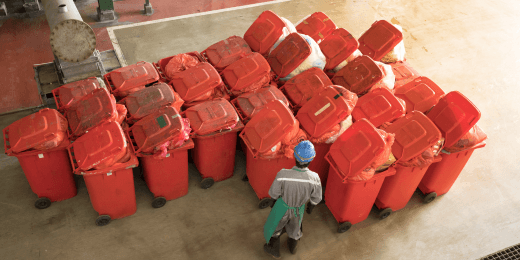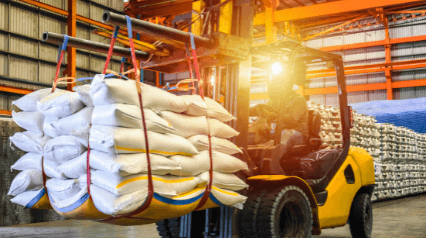Effective Hazardous Waste Management for Retail Stores
Understand the types of hazardous waste generated in retail and how to implement safe, compliant handling and disposal procedures.

Published 3 Oct 2025
Article by
7 min read
What is Hazardous Waste Management for Retail Stores?
Hazardous waste management for retail stores refers to the systematic identification, segregation, storage, and disposal of regulated waste streams, such as flammable, corrosive, reactive, and toxic substances. A legal requirement in many regions, retail companies must implement waste profiling and manifest tracking to avoid penalties and support environmental sustainability goals.
Importance
Many don't realize that retail stores generate significant amounts of hazardous waste from everyday items, like batteries, cleaning agents, leftover paint, and aerosols. Given the volume produced by this sector annually, implementing an effective waste management system is critically needed.
Protects employee and customer safety - Corrosive cleaners or flammable products pose risks of burns, poisoning, or respiratory issues. Effective management minimizes exposure and reduces the likelihood of accidents in the workplace.
Enhances environmental protection goals - Retail hazardous waste can contaminate soil, water, and air, harming public health and ecosystems. Responsible handling and disposal support sustainability goals, which is important for retailers these days.
Improves operational efficiency and higher cost savings - Organizing waste systems lowers disposal costs and avoids penalties from noncompliance. It can even create savings through recycling programs.
Guarantees regulatory compliance - Local, state, and federal laws governing hazardous waste are becoming increasingly stringent worldwide. Adherence to these rules avoids expensive penalties, complex remediation, and potential legal action.
Strengthens brand image - Modern consumers favor businesses that prioritize sustainability and ethical practices. Demonstrating a strong commitment to this builds customer trust, positioning the retailer as a responsible community player.
Efficiently Manage Retail Compliance Risks
Identify, evaluate, and mitigate risks to create a safe and secure environment for your employees and customers.
Types of Hazardous Wastes in Retail
Hazardous retail wastes often hide in plain sight. Identifying and understanding these is crucial because recognizing hazards is the first step to controlling them. These are some of the most common and effective retail hazardous waste removal methods for each:
Chemical Cleaners and Solvents
Degreasers, disinfectants, and thinners are commonly used in maintaining retail spaces. Due to their flammable, corrosive, or toxic properties, these must be stored in labeled and sealed containers before disposing of them through licensed hazardous waste contractors.
Expired or Damaged Pharmaceuticals and Personal Care Products
Damaged or expired over-the-counter medications, cosmetics, and personal care products can contaminate waterways and harm wildlife. Drugs may also be resold and misused. These should be returned to suppliers by following the pharmaceutical take-back programs, instead of being discarded with general trash.
Batteries and Electronic Waste
Used batteries (e.g., lithium, alkaline, lead-acid) are widely present in electronics stores and supermarkets. These should be collected in dedicated e-waste bins and then sent to processing centers to prevent heavy metals and corrosive substances from leaking into soil and groundwater.
Pesticides and Lawn Care Products
Insecticides, herbicides, and pesticides sold in hardware, home improvement shops, and garden stores have toxic properties that can pollute soil and water systems, then poison humans and animals. These should be kept in original containers, secured from food items, and disposed of through hazardous waste collection programs.
Fluorescent Lamps and Lighting Materials
Fluorescent tubes and compact fluorescent lamps (CFLs) contain highly toxic mercury. Found in all retail spaces as part of lighting systems or sold as products, these must be packaged carefully to prevent breakage and recycled through specialized recovery programs.
Create your own Browse Hazardous Waste Inspection checklist
Build from scratch or choose from our collection of free, ready-to-download, and customizable templates.
Relevant Regulations
In retail, environmental regulations and worker safety are intrinsically linked. Proper hazardous waste management is crucial, as it directly protects workers from exposure to harmful substances. Compliance is non-negotiable, as mandated by the following laws:
The Resource Conservation and Recovery Act (RCRA) of the US governs the cradle-to-grave management of waste. One of the strictest mandates, noncompliance can result in civil and criminal penalties, often amounting to millions of dollars.
Occupational Safety and Health Administration (OSHA) Standards in the US uphold workers' safety by requiring proper labeling and storage of hazardous substances through the Hazard Communication Standard. Penalties range from fines per violation to potential shutdowns for severe cases.
Environmental Permitting and Waste Duty of Care in the UK mandates businesses to store, transport, and dispose of waste at authorized facilities. Business owners may be imprisoned for serious offenses.
The Australian Dangerous Goods Code and Environmental Protection Laws regulate the classification, packaging, and transport of hazardous materials. Incredibly strict when it comes to logistics, the agency can suspend the operations of violators.
The European Union Waste Framework Directive establishes principles for waste prevention, reuse, and safe disposal. Guided by the "polluters pay" principle, parties responsible for producing hazards bear the heavy costs of managing them.
The Canadian Environmental Protection Act (CEPA) controls hazardous wastes and recyclables, including import and export. The law is stringent, enforcing large fines, imprisonment, or both for repeat offenses.
Best Practices for Managing Hazardous Waste in Retail
Retailers often struggle with stringent environmental regulations because of the sheer variety of products they sell or use. Adopting these best practices is essential to avoid costly missteps and potential accidents.
1. Accurately identify and classify waste.
Determine the hazard profile of all waste streams (e.g., flammable, toxic, corrosive) to manage them according to their risk. Safety Data Sheets (SDS) are a useful guide, reducing errors and ensuring compliance.
2. Label and document waste properly.
Marking containers with correct hazard symbols and keeping accurate records prevents accidents and enables compliance tracking. Waste management software solutions can automate tasks like label printing, routine inspections, and documentation.
3. Segregate and store waste safely.
Keep hazardous wastes separated by type and secure them in suitable containers to prevent dangerous reactions and limit exposure. Retailers with limited storage space can optimize their facilities through proper organization.
4. Train and educate employees.
Providing staff with knowledge on handling hazardous waste ensures consistent practices despite high turnover. Offer regular workshops, refreshers on waste management protocols, and online training courses to identify, plan for, and reduce knowledge gaps.
5. Inspect and monitor waste-related activities regularly.
Conduct scheduled checks on waste storage, labeling, and disposal to identify issues before they escalate into violations or safety incidents. Leveraging compliance monitoring solutions that offer digital audit tools and inspection checklists can streamline these recurring tasks.
6. Reduce, reuse, recycle.
Finding ways to minimize waste from the source and recover recyclables lowers disposal costs and the company's environmental footprint. Here are some specific ideas for hazardous waste reduction in retail:
Electronic shops - Offer take-back programs, allowing customers to return old gadgets, batteries, or accessories.
Clothing stores - Provide in-store textile recycling bins where customers can drop off old garments for reusing or upcycling.
Grocery or supermarkets - Partner with food banks to donate near-expiry but safe food or bring unsellable organics to composting or biodigestion facilities.
Home improvement depots - Offer return-to-store programs for unused or expired paints, pesticides, or fertilizers, then pass them on to certified contractors.
7. Partnering with licensed waste management services.
Expert waste handling is an essential investment, not just an added cost. Partnering with certified contractors for collection and disposal is mandatory to ensure hazardous waste is managed legally and safely, protecting the company from liability.
Ensure Compliance with Hazardous Waste Handling in Retail with SafetyCulture
Why Use SafetyCulture?
SafetyCulture is a mobile-first operations platform adopted across industries such as manufacturing, mining, construction, retail, and hospitality. It’s designed to equip leaders and working teams with the knowledge and tools to do their best work—to the safest and highest standard.
Automate waste handling activities, from tracking waste streams to scheduling pick-ups with certified partners. Reduce the risk of noncompliance by centralizing data for inspections, safety data sheets, and regulatory reporting. Protect employees, the general public, and the environment by promoting safer waste handling practices through a unified platform.
Save time and reduce costs
Stay on top of risks and incidents
Boost productivity and efficiency
Enhance communication and collaboration
Discover improvement opportunities
Make data-driven business decisions
FAQs about Hazardous Waste Management for Retail Stores
In this article
- What is Hazardous Waste Management for Retail Stores?
- Importance
- Types of Hazardous Wastes in Retail
- Relevant Regulations
- Best Practices for Managing Hazardous Waste in Retail
- Ensure Compliance with Hazardous Waste Handling in Retail with SafetyCulture
- FAQs about Hazardous Waste Management for Retail Stores
Related articles
Food Safety
Safety

Food Transportation
Learn more about food transportation: why it is a factor for food safety, what are transportation issues, and how to avoid them.
Chemical Safety
Safety

A Guide to OSHA’s Process Safety Management Standard
Learn about process safety management: an OSHA regulation that aims to prevent the release of highly hazardous chemicals using 14 elements.
Manufacturing Safety
Safety

Process Equipment in Modern Industrial Systems
Learn what process equipment is, the common types used, and how it supports efficient and safe operations across major industries.